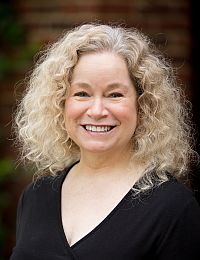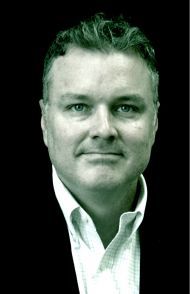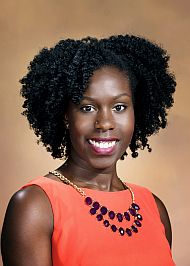
NEWS & EVENTS
Alumni Spotlight Interviews

Angela Robbins, Ph.D. 2010
Dr. Angela Robbins is an Associate Professor in the Department of History, Political Science, and International Studies at Meredith College in Raleigh, North Carolina, where she specializes in women's history. Her most recent projects include an essay in the edited volume North Carolina's Experience during the Great War, contributions to the Biographical Database of Militant Woman Suffragists, and serving as conceptual editor for the Tar Heel Junior Historian.
-
When did you first develop an interest in history?
It's probably always been there, but it wasn't in the traditional setting of the classroom where it manifested most of the time. Field trips to historic sites and museums caught my interest, and I remember looking things up in encyclopedias and other reference books at a very young age. When I reflect on that now I realize that it's because I needed to understand the context of the historical events and figures that fascinated me. It was the same for me when it came to things like holidays and traditions—I had to understand how these things came to be. I have always enjoyed reading biographies, and as I got older, I gravitated toward historical dramas and documentary films. But I have to admit that I wasn't really inspired by history classes when I was in middle or high school, and I think that's because context wasn't usually the focus. That all changed in college, and that's when I became a full-fledged history nerd. When my students tell me that they didn't enjoy history in high school but they like it now that they're in college, that completely resonates with me.
-
What do you value most about your history degree?
Aside from the joy of being immersed in the study of history, I was pushed in ways I never had been before. My B.S. is actually in Middle Grades Education, and I took history courses because I was specializing in Social Studies. It was because of the rigor and rewards in those history courses as an undergraduate student that I knew history was the right path for me when I decided to attend graduate school. The professors that I studied under at UNCG always challenged and inspired me. Bill Link (former department chair, now at UF) is one of the main reasons I chose history to begin with, and many others—Lisa Tolbert, Jeff Jones, Chuck Bolton, Watson Jennison, Peter Carmichael, and especially Lisa Levenstein—shaped my research and teaching in profound ways, serving as consummate professional role models from the M.A. to the Ph.D. I was both a non-traditional and a first generation student, so I needed different kinds of support and encouragement from them as well. Those relationships were invaluable to me, and I want to do for my students what my professors did for me.
-
How would you say that you have used the skills and knowledge you developed as a history major in your career? These can be in your day-to-day activities or in long-term planning and/or strategizing your professional path.
There are so many skills associated with the practice of history that have enriched my life and my career, and which I use every day, but one of the most rewarding things I do on a regular basis is advise student researchers, particularly seniors working on the thesis. I'm fully invested from concept to final product, evaluating and coaching every step of the way, as they hone the various skills critical to sound scholarship. It keeps me sharp! Also, I work at a teaching college, and one of the best things my professors at UNCG did for me was to prepare me for the classroom and for advising. Not all universities get their Ph.D. candidates into the classroom, but UNCG does. I learned so much about course and syllabus design, creating assignments that offer students practice in historical inquiry, and what it means to be an effective teacher.
-
What advice would you give a graduating history major setting out in today's job market?
Studies show that employers are looking for applicants who have the kind of skills and experience you gained as a history major. Let them know you're the right person for the job by communicating effectively in your resume and your interview what those skills are, how you applied them in your course work and research, and how they will translate to the workplace. Discuss specific examples of how you used critical thinking and problem solving skills; tell them what you brought to the table in collaborations with other students and scholars; note how you demonstrated personal accountability and effective project management through your research projects; talk about your strengths and your leadership experience as well as your eagerness to learn from and listen to others on the team.
-
What advice would you give a first year student considering majoring in history?
Go for it! Drop your preconceptions at the door and be open to challenges and possibilities, because you have never examined historical events and actors or engaged with historical evidence and scholarship in the ways you will be expected to. Make the most of your college experience by taking a variety of courses with different professors. Look forward to internships and part-time jobs that allow you to build practical experience and connections with others in the field. Also, don't buy into notions that the humanities generally won't lead to good jobs; refer naysayers to studies published in Forbes and other publications which show that history majors are highly competitive in various fields, including business, government, and non-profits, because they have the skills employers are seeking.
-
Is there anything else you would like to share with our students about your passion for history and/ or its relationship to your professional experience?
I love what I do, and my experience is that most people delight in talking about our shared history and making connections between the past and present. Whether it is organizing a conference on campus, giving talks at other institutions, or collaborating with community partners, I look for opportunities to bring history to as many people as possible. I work at a small college in a small department, where we prioritize interdisciplinary and collaborative projects; currently, we're organizing a symposium at Meredith College celebrating the 100th anniversary of the 19th Amendment, and we have students from various disciplines including theatre, art, and sociology contributing their talents. It enriches everyone's experience to bring historical perspectives to students and colleagues in other fields; likewise, history is most valuable when we historians are able to communicate its relevance to a diverse audience.

Kevin Greene, Ph.D. 2011
Dr. Kevin Greene is the Nina Bells Suggs Assistant Professor of History and Director of the Center for Oral History and Cultural Heritage at the University of Southern Mississippi. He published The Invention and Reinvention of Big Bill Broonzy by UNC Press in 2018.
-
When did you first develop an interest in history?
In the sixth grade I constructed a National History Day project investigating Jonas Salk's work with the Polio vaccination. At the time, the Salk Institute had moved its research focus to the AIDS crisis. The project examined his work with Polio and revealed how he was employing similar research methods and strategies to finding a cure for Aids. At eleven years old, my partner and I were able to interview Salk. The project won regional and state titles in its category and finished in the top ten at the national competition in Washington D.C. After what would be my first trip to the capital, I became fascinated by history.
-
What do you value most about your history degree?
My work in history has taught me to be an independent and nimble thinker. Pursuing a history degree forces one to be curious and suspicious of knowledge and information, therefore compelling us to draw our own conclusions. I research and investigate literally everything--the restaurants I eat in, the strings I put on my guitars, the shampoo I use on my hair, and on and on. My history degree has provided me with a lifelong thirst to read and investigate nearly every facet of my life.
-
How would you say that you have used the skills and knowledge you developed as a history major in your career? These can be in your day-to-day activities or in long-term planning and/or strategizing your professional path.
I followed the long path to becoming a professional historian. As an undergraduate student in history, I was taught to construct and defend a history thesis as part of my degree requirement. I wrote that thesis comparing two great African American musicians. This month, I published my first book as a professional historian. The book features the same two musicians and many more. The drive and focus needed to complete a degree in history has helped carry me along the challenging path toward becoming a university professor.
-
What advice would you give a graduating history major setting out in today's job market?
Trained historians often have strong instincts. I would urge recent history majors to trust their own instincts and put those to good use in whatever field they pursue. Problem solving, critical thinking, synthesizing information, and effective communication are the powerful tools in a historian's tool kit that make history majors strong job candidates for many potential employers.
-
What advice would you give a first year student considering majoring in history?
We need you. We are a futuristic society and culture in that we constantly look forward to the next great thing, whatever it may be. If we are going to live up to our potential as a people, we need good historians to constantly remind us to look backwards and wrestle with where we came from. Without the balance created by looking forward while thinking about the past we can never truly come to terms with where we are in the moment.
-
Is there anything else you would like to share with our students about your passion for history and/ or its relationship to your professional experience?
Find places in your history courses and course work to discover yourself. The past is an amazing arena for self-exploration.

Angela Thorpe, M.A. 2014
Angela Thorpe is Associate Director of the North Carolina African American Heritage Commission. She received her B.A. in History from the University of Florida and her M.A. in History with a concentration in museum studies from UNCG.
-
When did you first develop an interest in history?
I first developed an interest in history--and culture--as a child. I grew up in a military family. My father was an officer in the U.S. Air Force, and we lived in several states and in Europe. My parents rarely took us on "traditional" vacations; instead, we would connect with museums, cultural institutions and even other cultures during our breaks from school. For example: we visited Neuschwanstein Castle during one holiday break while living overseas, and even Amish Country during a break when we lived in Ohio. I think it was this exposure that made me absolutely fascinated with history and culture as a child. In addition, I lived in England during the period when most kids in the U.S. were learning about the U.S. Presidents and civics. At my school, we took British history courses. England's got some really juicy history--so I was hooked.
-
What do you value most about your history degree?
My degree empowered me to tell stories: through objects; using interpretive techniques; by listening to and being responsive to communities; and digitally. I consider myself a storyteller above all else. In my day-to-day work, I am responsible for shaping and sharing stories that are underrepresented--or simply ignored. My degree gave me the tools and confidence I needed to tell rich stories in creative ways, and with compassion.
-
How would you say that you have used the skills and knowledge you developed as a history major in your career? These can be in your day-to-day activities or in long-term planning and/or strategizing your professional path.
On a broad scale, the community engagement skills I developed at UNCG have been invaluable. I am grateful that so much of our work featured community-centered elements, because I work with a variety of communities daily, including African American communities and arts and culture professionals. I work with these groups to develop programs; navigate partnerships; respond to specific needs; and educate/share information. The community engagement work I experienced at UNCG taught me how to communicate with different types of people from all stations in life. Those skills also taught me how to listen to people (a key part of communication!), which is critical to my work.
-
What advice would you give a graduating history major setting out in today's job market?
Maintain the relationships you have developed with your professors, mentors, internship supervisors, the people you've held informational interviews with and even people who interview you. Stay in touch with these people, even if it's a brief e-update every few months, or coffee once in a while. Relationships are key to career evolution. These people will assist you while you're on the market; point you in the direction of job opportunities; and so much more. For example: I did not get the first job I interviewed for. Although I was disappointed, I stayed in touch with the person who interviewed me. Over a year later, this person gave me my first big consulting gig--they knew what I was up to, and they were very familiar with my skills. That saying, "it's not what you know, it's who you know," still rings true today.
-
What advice would you give a first year student considering majoring in history?
Get engaged! There are so many things that you can do with a major in history, and so much that you can get involved with. Volunteer. Shadow people who you think have interesting jobs. Join the history club. Go to programs in the history department. It's these actions that will help you learn; build your network; activate your skills; take advantage of meaningful opportunities, like internships and fellowships; and connect to job and graduate school possibilities.
-
Is there anything else you would like to share with our students about your passion for history and/ or its relationship to your professional experience?
For me, it's very important to be bold and brave in my career. I would encourage students to do the same. It takes a courageous person to live out one's passion fully. So, take risks, take chances and try new opportunities. Apply for that job you think you're not qualified for. Accept that internship that's several states away. Pitch a story to that history blog you're always glued to. Reaching is scary. But you'll be surprised where it can get you. It's the biggest risks I've taken that have yielded the greatest rewards in my career.